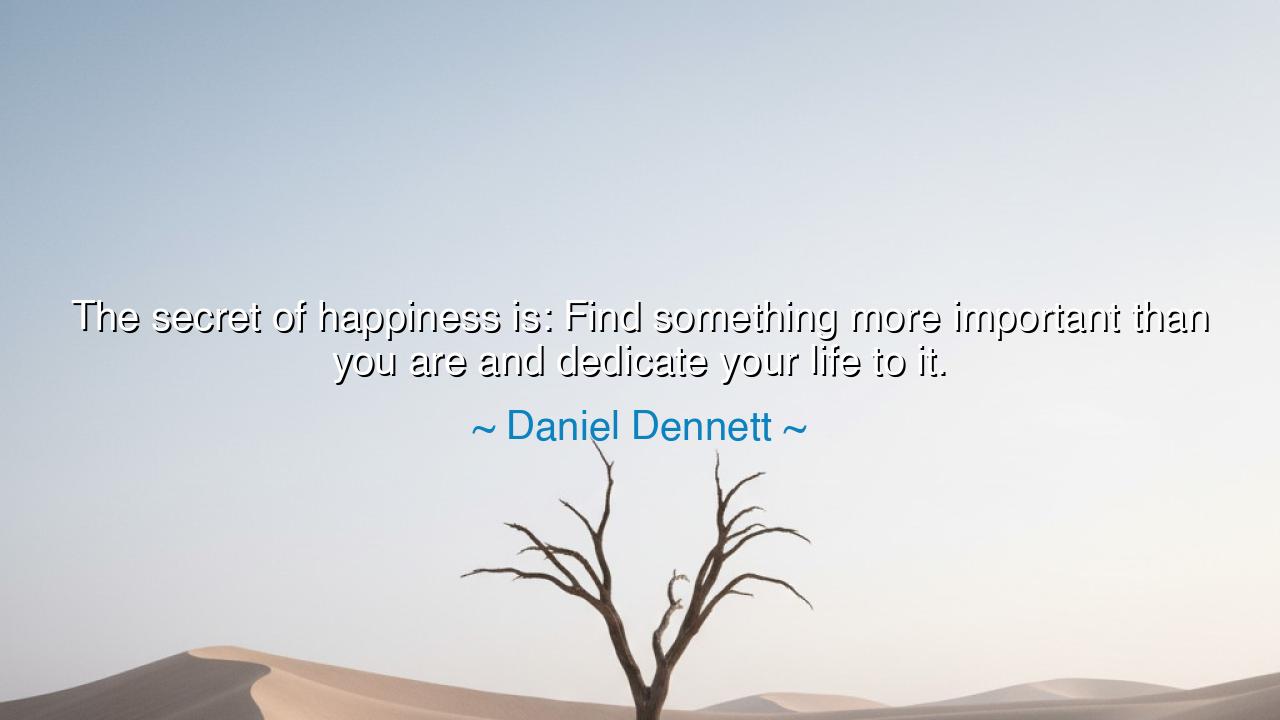
The secret of happiness is: Find something more important than
The secret of happiness is: Find something more important than you are and dedicate your life to it.






“The secret of happiness is: Find something more important than you are and dedicate your life to it.” Thus declared Daniel Dennett, philosopher and thinker, whose mind sought to unravel the mysteries of consciousness and the meaning of human existence. Yet in this single sentence, he gives not a theory, but a truth—a truth as ancient as the human heart itself. For what is happiness, if not the harmony between one’s spirit and one’s purpose? And what is purpose, if not the devotion to something greater than the self? Dennett’s words are a summons to transcendence: a call to rise above the narrow boundaries of ego and comfort, and to pour one’s life into a cause that outlives one’s years.
The origin of this quote lies in Dennett’s lifelong meditation on meaning. As a philosopher of mind and science, he explored the nature of consciousness, the illusion of free will, and the architecture of morality. Yet through all his reasoning, he found that intellectual brilliance alone could not bring joy. Knowledge without devotion is cold; reason without purpose is hollow. His insight—that happiness is born of dedication to something greater—reflects the wisdom of centuries, distilled through the clarity of the modern age. He saw that the happiest people are not those who chase pleasure, but those who serve an idea, a people, or a truth beyond themselves.
The ancients, too, understood this secret. Aristotle spoke of eudaimonia, the flourishing of the soul that comes from fulfilling its highest potential. He taught that true happiness does not come from indulgence but from virtue—from living in accordance with one’s purpose. Marcus Aurelius, emperor and philosopher, echoed the same: “Waste no more time arguing about what a good man should be. Be one.” He found contentment not in ruling an empire, but in serving its greater good. Likewise, Dennett reminds us that the self grows strongest when it serves something beyond its own shadow, when life becomes an offering instead of a demand.
Consider the story of Mother Teresa, who left her home and comfort to serve the poor in the streets of Calcutta. Her life was not filled with ease or luxury; it was marked by sickness, fatigue, and sorrow. Yet she radiated a peace that kings could envy. Her happiness did not come from what she gained, but from what she gave. Her dedication to a purpose larger than herself turned suffering into sanctity, and labor into love. She lived Dennett’s teaching long before he put it into words: that the soul finds its joy not in self-centered pursuit, but in self-forgetting devotion.
To “find something more important than you are” is to recognize the smallness of one’s own desires within the vastness of the world. It is to look beyond comfort and ambition and ask: What is worthy of my life? Such a question is not easy to answer, for it demands humility and courage. It may lead you to art, to truth, to justice, to family, to faith, or to service. Whatever your answer, let it demand the best of you. For happiness is not the reward of ease—it is the byproduct of dedication, the fruit of commitment to something that gives meaning to your struggle and dignity to your days.
Dennett’s wisdom reminds us that the search for happiness through self-gratification is a mirage. Pleasure fades, possessions rust, and praise is fickle—but purpose endures. The heart that serves a noble cause cannot be defeated, even in hardship. The artist who paints for beauty’s sake, the teacher who uplifts the mind, the parent who sacrifices for a child, the citizen who stands for justice—all these are architects of true happiness, for they have anchored their joy to something the world cannot take away.
The lesson, then, is both clear and eternal: do not seek happiness directly. Seek meaning. Choose a purpose so vast that it humbles you, so luminous that it draws you beyond your own smallness. Give yourself wholly to it—your time, your effort, your love—and happiness will come, not as a goal, but as a companion. The river does not chase its reflection; it flows, and the reflection follows. So it is with happiness: it follows those who move with devotion and courage toward something greater than themselves.
So, my listener, ask yourself each dawn: What is the work that outlives me? What is the cause that calls me? For the secret of joy lies not in the self, but in the giving of the self. Dedicate your life to what uplifts the world—be it love, truth, or compassion—and you will find that happiness is no longer something to chase, but something that flows through you like sunlight through an open window. For the soul that serves a higher purpose is already free, already whole, already radiant with the quiet glory of meaning fulfilled.






AAdministratorAdministrator
Welcome, honored guests. Please leave a comment, we will respond soon